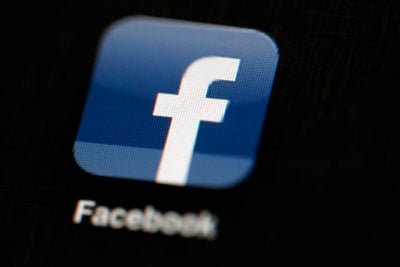Good job, Facebook, but don’t stop now
Published 11:36 am Saturday, October 13, 2018

- The Facebook logo is displayed on an iPad. AP photo
The Washington Post
Facebook is going after media manipulation. Just don’t call it misinformation.
The company, which announced the removal this week of more than 800 publishers and accounts for political spamming, has stressed that its decisions were based on how users behaved, not the content they shared. It is easy to see why: Facebook is fighting the spread of distorting material ahead of next month’s midterm elections, but sidestepping any subjective choices about moderation that could inflame the public or legislators.
The removals, which affected both right-leaning and left-leaning accounts, are a reminder that influence campaigns do not originate only with foreign adversaries. People here at home have learned a few tricks from Russia- whether they are meddling for monetary profit or political gain. And while most Americans cheer on Facebook rooting out overseas interference, shutting down domestic actors raises concerns about free speech. Umpiring truth is no easy task; it can be difficult to determine what is legitimate expression and what are falsehoods too dangerous to let stand.
This difficulty explains the social-media platform’s decision to focus on objective standards around spamming. This week’s purged pages attacked the marketplace of ideas; they did not contribute to it. By artificially inflating their audiences through fake accounts, likes and shares, these actors flooded users’ news feeds to create an illusion of U.S. consensus on key issues. The worst of them even fooled Americans with seesawing name changes calibrated for popularity: A page called “What About Hillary’s Emails?” one month could be called “Save the DREAMers” the next, and “Capitals in the Stanley Cup” the month after that.
Facebook did not examine the content the pages disseminated, and some of them may not have shared information that is technically false at all. Still, last week’s removals and any that follow will likely eliminate some prominent purveyors of misinformation — just as Alex Jones was banned from Facebook not for his signature hoaxes but for violating its hate-speech policies. Though Facebook may eventually have to answer the misinformation question directly, cutting down on distorting behavior is a smart way to eliminate some of the noise online without prompting even more shouting on Capitol Hill.
As Facebook gets more aggressive in policing its platform, it should take care to prioritize transparency where it can for users whose accounts are removed. It should also invest more in appeals processes: At least one of the publishers named this week plans to plead his case. And Facebook users should feel warned: 800 accounts are gone, but many more likely lurk undetected or undisciplined. Facebook cannot afford to stop there.

